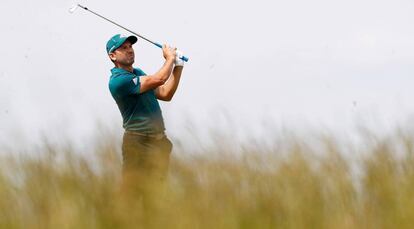Is Spanish golf losing its drive?
Sergio García and Jon Rahm are flying high, but the sport lacks sponsorship and is still seen as elitist

One thing is Spanish golf, and another is golf in Spain. The former is in rude health, judging by Sergio García’s performance in the Masters, the rising star Jon Rahm, and the rebirth of Rafa Cabrera-Bello, who won the Scottish Open on Sunday.

But the latter is on life support: for the seventh consecutive year, the number of people obtaining a license with the Royal Spanish Golf Federation (RFEG) has dropped, and the Spanish Open has gone, leaving the Andalusia Masters as the only European tournament this year on Spanish soil. The absence of public and private investment has had a big impact on a sport that has not recovered from the collapse of the property sector a decade ago. Golf rakes in money from tourists, but most Spaniards still see it as expensive and elitist.
“We are suffering as a result of the crisis. Now we are trying to encourage people to play. Golf is healthy, it creates jobs and it helps the economy,” says Gonzaga Escauriaza, president of the RFEG since 2008. Around 1.1 million people come to Spain from abroad each year to play golf during their vacation. Most of them visit Andalusia, the Balearics, Catalonia, Murcia and Valencia, spending some €2 billion a year.
It is possible to play for €5 on small courses, while a set of clubs costing €150 will last you 15 years Gonzaga Escauriaza, president of the RFEG
There are around 400 golf courses in Spain. Membership of the RFEG costs €75 a year, although it is not a requirement at many clubs. “There are three main lies about golf,” says Escauriaza: “One, that golf is expensive and elitist. It is possible to play for €5 on small courses, while a set of clubs costing €150 will last you 15 years. Two, that it uses a lot of water. Consumption on courses makes up 0.0001% of water consumption in Spain, and it is recycled. Finally, that it damages the environment. All this creates a big image problem.”
The bubble has burst. In 2011, Spain hosted seven tournaments on the European circuit. The last to go was the Spanish Open, just when players like Sergio García, Jon Rahm and Rafa Cabrera-Bello are attracting international attention.

“The state has shown no interest in investing in golf because there is a belief that tourists will come anyway. That’s a mistake. Other countries are investing, and that means more competition. The state invests nothing. Politicians avoid us like the plague, offering nothing. It is irresponsible. Private sponsorship has fallen by half and we cannot manage,” says Escauriaza. “The European tour tasked two companies with finding sponsors for the Spanish Open and they raised nothing. That’s why it’s not being held here, because it would be irresponsible. In the United States, 80% is paid for through television rights and there is a long tradition of sponsorship. Europe has been lucky with Rolex, but we have suffered.”
The Masters, which is being held at the Valderrama course in Cadiz on a €4-million budget, is the only major tournament this year in Spain. The regional government of Andalusia, an area of Spain where many people work in the golf sector, is contributing €1 million. The rest is being covered by the European circuit. “We have not managed to attract any private investment,” admits Javier Reviriego, director general of the Valderrama course, which is widely considered Spain’s finest.
Reviriego calls on the RFEG to “promote the sport and make it more attractive to businesses.”
The state has shown no interest in investing in golf because it believes tourists will come anyway Gonzaga Escauriaza, president of the RFEG
In turn, the RFEG says its job is to “help amateurs become professionals” through initiatives such as the Challenge Tour. “That is our obligation, to invest in raw talent, not to organize an Open,” says its president.
Nathan Horner, the commercial and marketing director of the European Tour, says that Spain needs to look for money outside the country. “The first three tournaments of 2017 have been sponsored by multinationals: the PGA in England by a German company, BMW; the French Open by China’s HNA; and the Irish Open by Dubai Duty Free. The Spanish Open has had Reale Seguros,” he says, adding: “We would love to have a domestic company as sponsor, but the plan is to look in Spain and abroad.”
Gonzalo Fernández-Castaño, a player with a business interest in the Madrid Masters, which was cancelled in 2012 after its sponsor, Bankia, ran into financial problems, says “Spain needs new sponsorship laws that give tax breaks to companies that support sport.”
Losing out to France to host the 2018 Ryder scared many sponsors away. Spanish golf is shining, but golf in Spain needs oxygen.
English version by Nick Lyne.
Tu suscripción se está usando en otro dispositivo
¿Quieres añadir otro usuario a tu suscripción?
Si continúas leyendo en este dispositivo, no se podrá leer en el otro.
FlechaTu suscripción se está usando en otro dispositivo y solo puedes acceder a EL PAÍS desde un dispositivo a la vez.
Si quieres compartir tu cuenta, cambia tu suscripción a la modalidad Premium, así podrás añadir otro usuario. Cada uno accederá con su propia cuenta de email, lo que os permitirá personalizar vuestra experiencia en EL PAÍS.
¿Tienes una suscripción de empresa? Accede aquí para contratar más cuentas.
En el caso de no saber quién está usando tu cuenta, te recomendamos cambiar tu contraseña aquí.
Si decides continuar compartiendo tu cuenta, este mensaje se mostrará en tu dispositivo y en el de la otra persona que está usando tu cuenta de forma indefinida, afectando a tu experiencia de lectura. Puedes consultar aquí los términos y condiciones de la suscripción digital.








































